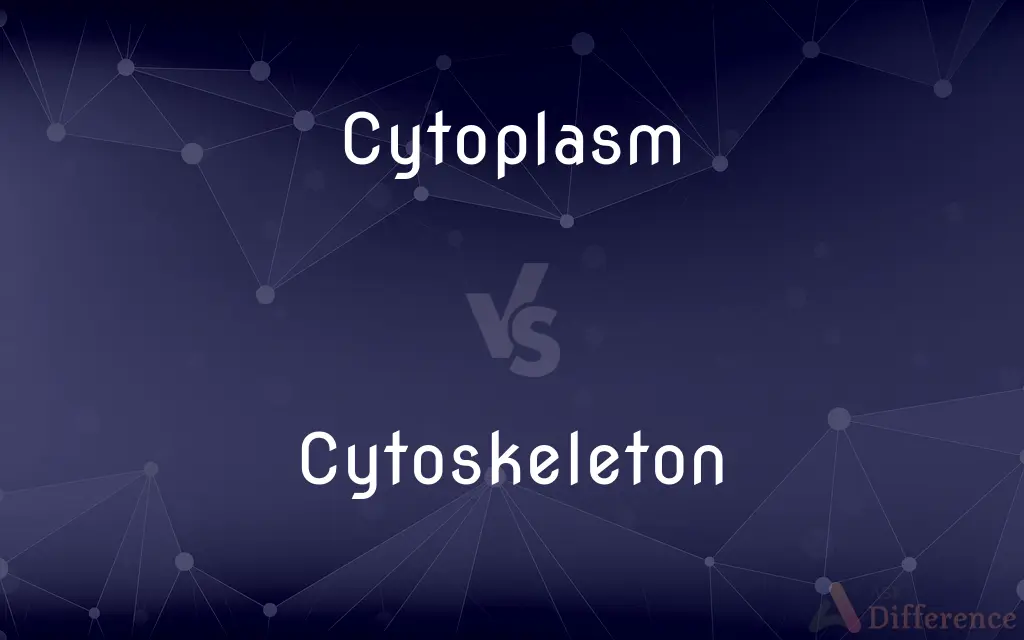Cytoplasm vs. Cytoskeleton — What's the Difference?
By Tayyaba Rehman — Updated on September 22, 2023
Cytoplasm is the jelly-like substance within a cell that contains cellular components and is the site for many cellular processes. The cytoskeleton is a structural framework within the cytoplasm, made of protein filaments, that gives the cell its shape an

Difference Between Cytoplasm and Cytoskeleton
Table of Contents
ADVERTISEMENT
Key Differences
Cytoplasm is the semi-fluid substance that fills the interior of a cell, acting as a medium where various cellular components like mitochondria, ribosomes, and endoplasmic reticulum are suspended. The cytoskeleton, on the other hand, is a structural framework within the cytoplasm, consisting of protein filaments like microtubules, actin filaments, and intermediate filaments. It gives the cell its shape, aids in intracellular transport, and facilitates movement.
The cytoplasm serves as the location where many cellular processes, such as metabolic pathways and signal transduction, occur. It consists mostly of water but also contains ions, small molecules, and larger macromolecules. The cytoskeleton serves more of a structural role, providing the architectural layout of the cell, and helping to organize the cell's components.
The cytoplasm's role is essentially passive—it provides a location for biochemical processes but doesn't actively drive those processes. Conversely, the cytoskeleton is much more dynamic. It can rapidly assemble and disassemble its components to allow for cell movement, division, and response to environmental cues.
Both the cytoplasm and the cytoskeleton are critical for cell function, but they serve distinct roles. The cytoplasm is like the 'stage' where the cellular processes take place, while the cytoskeleton is like the 'scaffolding' that shapes the stage and allows for movement and organization. Their functions are interconnected, and the cytoskeleton is physically located within the cytoplasm, adding an additional layer of complexity to cellular function.
Comparison Chart
Primary Role
Cellular Medium
Structural Framework
ADVERTISEMENT
Composition
Water, ions, molecules
Protein Filaments
Function
Biochemical Processes
Cell Shape, Movement
Dynamics
Mostly Passive
Highly Dynamic
Location
Inside Cell Membrane
Within Cytoplasm
Compare with Definitions
Cytoplasm
Cytoplasm is mainly composed of water, ions, and macromolecules.
Many biochemical reactions take place in the cytoplasm.
Cytoskeleton
Cytoskeleton provides structural support to the cell.
The cytoskeleton helps the cell maintain its shape.
Cytoplasm
Cytoplasm fills the space between the cell membrane and the nucleus.
The cytoplasm occupies most of the cell's volume.
Cytoskeleton
Cytoskeleton helps with the intracellular transport of materials.
Motor proteins move along the cytoskeleton.
Cytoplasm
Cytoplasm serves as the medium for cellular processes.
Enzymes in the cytoplasm catalyze metabolic reactions.
Cytoskeleton
Cytoskeleton is made of protein filaments like actin and tubulin.
Microtubules are a component of the cytoskeleton.
Cytoplasm
Cytoplasm is the jelly-like material inside a cell.
The cytoplasm holds various cellular organelles.
Cytoskeleton
Cytoskeleton aids in cell division and movement.
The cytoskeleton reorganizes during cell division.
Cytoplasm
In cell biology, the cytoplasm is all of the material within a eukaryotic cell, enclosed by the cell membrane, except for the cell nucleus. The material inside the nucleus and contained within the nuclear membrane is termed the nucleoplasm.
Cytoskeleton
The cytoskeleton is a complex, dynamic network of interlinking protein filaments present in the cytoplasm of all cells, including bacteria and archaea. It extends from the cell nucleus to the cell membrane and is composed of similar proteins in the various organisms.
Cytoplasm
The protoplasm enclosed by the plasma membrane of cell, excluding the nucleus in eukaryotic cells and cellular DNA in prokaryotic cells.
Cytoskeleton
The internal framework of a eukaryotic cell, composed of protein filaments that provide structural support and drive the movement of the cell and its internal components, typically divided into three categories (microfilaments, intermediate filaments, and microtubules) based on the diameter and composition of the filaments.
Cytoplasm
(cytology) The contents of a cell except for the nucleus. It includes cytosol, organelles, vesicles, and the cytoskeleton.
Cytoskeleton
A matrix of intercellular protein, in the forms of microfilaments and microtubules, that provide some rigidity to cells
Cytoplasm
The substance of the body of a cell, as distinguished from the karyoplasma, or substance of the nucleus.
Cytoskeleton
An arrangement of microtubules, microfilaments, and larger filaments within a cell serving to provide structural support of components of the cell, and to transport components from one part of the cell to another; the filaments are composed of protein and form a latticelike arrangement which may change rapidly with time.
Cytoplasm
The protoplasm of a cell excluding the nucleus
Cytoskeleton
A microscopic network of actin filaments and microtubules in the cytoplasm of many living cells that gives the cell shape and coherence
Cytoplasm
Cytoplasm contains the cell's organelles except for the nucleus.
Mitochondria are suspended in the cytoplasm.
Cytoskeleton
Cytoskeleton is a dynamic structure that can change quickly.
The cytoskeleton adapts to environmental stimuli.
Common Curiosities
What is the main role of the cytoplasm?
The main role of the cytoplasm is to serve as the medium for cellular processes.
What is the cytoskeleton?
Cytoskeleton is a structural framework within the cytoplasm made of protein filaments.
Do both cytoplasm and cytoskeleton participate in cell division?
Yes, both are essential for cell division but in different ways.
What is the main role of the cytoskeleton?
The main role of the cytoskeleton is to provide structural support and enable movement.
Is the cytoskeleton part of the cytoplasm?
Yes, the cytoskeleton is located within the cytoplasm.
What is the cytoplasm made of?
It is mostly made of water, ions, and macromolecules.
What is cytoplasm?
Cytoplasm is the semi-fluid substance within a cell where cellular components are found.
What is the cytoskeleton made of?
It is made of protein filaments like actin, tubulin, and intermediate filaments.
Does the cytoplasm contain enzymes?
Yes, it contains enzymes that catalyze biochemical reactions.
Does the cytoskeleton interact with organelles?
Yes, it helps to position and transport organelles within the cell.
Is the cytoplasm dynamic?
It is mostly passive but can show some dynamism during cellular processes.
Is the cytoskeleton dynamic?
Yes, it is highly dynamic and can change rapidly.
Can cells survive without a cytoskeleton?
No, the cytoskeleton is crucial for maintaining cell structure and function.
Can cells survive without cytoplasm?
No, the cytoplasm is essential for cell survival.
How do cytoplasm and cytoskeleton interact?
The cytoskeleton is within the cytoplasm and contributes to its organization and function.
Share Your Discovery

Previous Comparison
Borax vs. Flux
Next Comparison
Unreeve vs. WithdrawAuthor Spotlight
Written by
Tayyaba RehmanTayyaba Rehman is a distinguished writer, currently serving as a primary contributor to askdifference.com. As a researcher in semantics and etymology, Tayyaba's passion for the complexity of languages and their distinctions has found a perfect home on the platform. Tayyaba delves into the intricacies of language, distinguishing between commonly confused words and phrases, thereby providing clarity for readers worldwide.















































